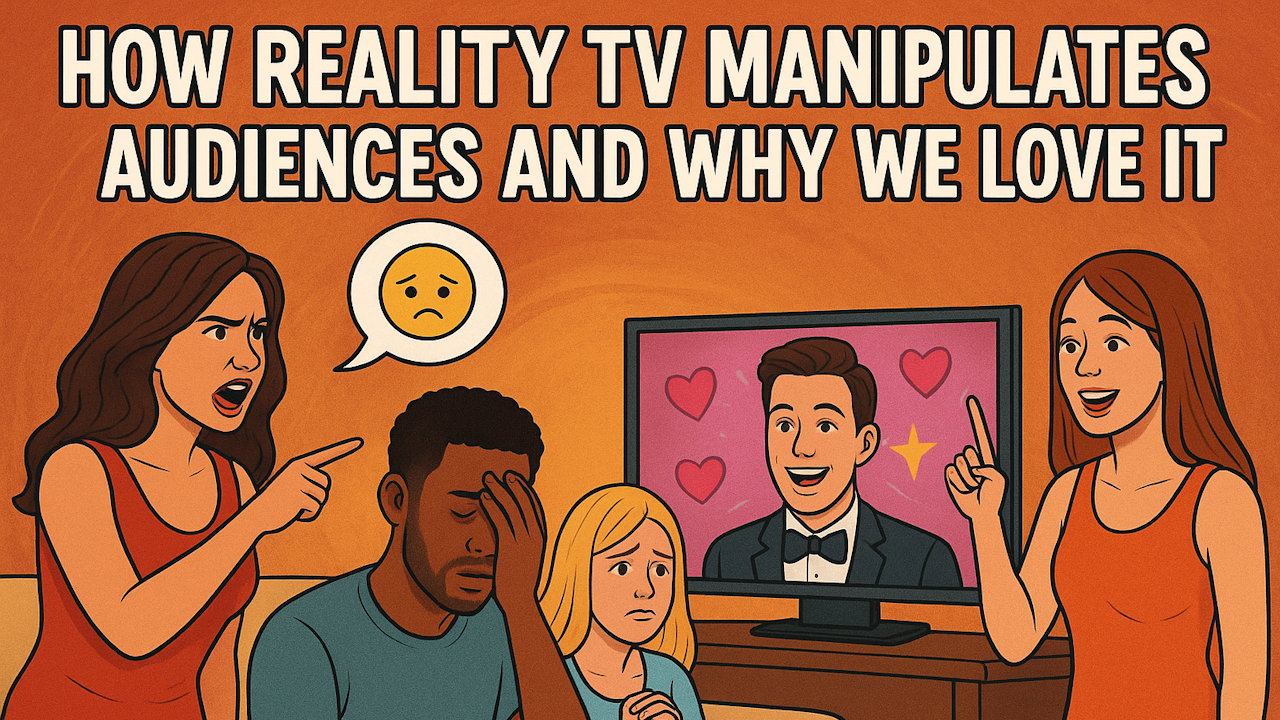Reality television has become one of the most dominant forms of entertainment in the modern media landscape. From dating competitions and survival shows to cooking battles and real-life drama series, reality TV attracts millions of viewers worldwide. While the term “reality” suggests authenticity, the truth is far more complicated. Producers carefully design these shows to manipulate audience emotions, create heightened drama, and keep viewers glued to their screens. What is fascinating is that even though audiences often know these manipulations exist, they continue to watch with enthusiasm. This tension between awareness and enjoyment reveals a deeper relationship between media producers and viewers, one that relies on psychology, spectacle, and our desire for connection.
One of the most powerful tools reality TV uses to manipulate audiences is editing. Hours of raw footage are condensed into a few episodes, and during this process, producers shape narratives by choosing what to include and what to cut. A cast member who may have a balanced personality can be edited to appear as the “villain” if producers highlight moments of anger or selfishness while ignoring their positive traits. Similarly, a quieter contestant might be shown only when they cry or express vulnerability, reinforcing a role as the “underdog.” These editing techniques create character archetypes that mirror fictional storytelling, giving the audience clear figures to root for or despise. By crafting heroes and villains, producers tap into our natural attraction to stories with conflict and resolution.
Music and sound design also play an essential role in guiding audience reactions. A tense silence before someone reveals a secret, suspenseful music leading into an elimination, or upbeat tunes during a makeover scene all work together to dictate how viewers feel. Without these cues, a scene might appear dull or ambiguous. With them, it becomes emotionally charged and memorable. In this way, producers not only present events but also tell viewers how to interpret them. The audience often feels emotions that are less about the actual events and more about how those events have been packaged.
Another form of manipulation comes from the structure of the shows themselves. Many reality programs are built around competition, elimination, or cliffhangers. These features create constant anticipation. At the end of an episode, viewers are left wondering who will win, who will be sent home, or what twist will occur next. This strategy encourages binge-watching or loyal weekly viewing. The psychological principle at work here is called the “Zeigarnik effect,” which suggests that people remember unfinished tasks better than completed ones. Reality TV exploits this by leaving storylines unresolved so that viewers feel compelled to return.
The casting process is equally deliberate. Producers rarely select participants at random. Instead, they choose individuals who represent a wide range of personalities, appearances, and backgrounds. This diversity increases the chances of conflict and sparks interest among different segments of the audience. Often, extreme personalities are included because they are likely to generate strong reactions, whether positive or negative. When viewers become invested in certain cast members, they are more likely to discuss the show with friends or online, which further increases its cultural impact. Reality TV thrives not only on-screen but also in conversations, memes, and social media debates that extend the drama beyond the television set.
Given these layers of manipulation, a natural question arises. Why do audiences love reality TV so much, even when they know it is heavily staged or edited? Part of the answer lies in escapism. Watching people compete, fall in love, or argue provides entertainment that distracts us from our own daily problems. Reality shows offer a chance to live vicariously through others’ experiences, whether it is surviving on a deserted island, dating multiple partners, or cooking gourmet meals under pressure. The situations may be unrealistic, but they allow us to imagine ourselves in exciting scenarios.
Another reason for the popularity of reality TV is the sense of relatability. Unlike scripted dramas with polished actors, reality shows feature ordinary people or at least individuals presented as such. Viewers may see themselves in these participants and feel a stronger connection. Even when contestants are exaggerated, they reflect recognizable aspects of human behavior. Seeing others struggle, succeed, or fail provides a mirror for our own emotions and experiences.
Reality TV also fulfills a social function. People enjoy discussing shows with friends, family, or strangers online. Debating who should win, speculating about future episodes, or criticizing contestants creates a shared cultural experience. This sense of community is one of the strongest draws of reality television. In a fragmented media environment, reality shows still manage to bring large groups of people together in collective conversations.
Finally, audiences are drawn to the emotional rollercoaster that reality TV provides. By manipulating suspense, surprise, and conflict, producers deliver constant highs and lows. Viewers may cry during heartfelt moments, feel tension during competitions, or laugh at awkward exchanges. These emotional experiences are addictive. Even when viewers recognize that the emotions are orchestrated, the feelings remain real. Just as a movie can make us cry despite being fictional, reality TV can move us while still being heavily edited.
In conclusion, reality television manipulates audiences through editing, sound, structure, casting, and psychological tricks. These strategies create stories that feel authentic while being carefully controlled. Despite knowing this, viewers continue to embrace reality TV because it provides escapism, relatability, social connection, and emotional intensity. Reality television may blur the line between fact and fiction, but its enduring popularity shows that what audiences ultimately seek is not pure reality but entertaining and emotionally engaging narratives. We may be aware of the manipulation, yet that awareness does little to lessen our enjoyment. Instead, it might even enhance the experience, allowing us to participate knowingly in the spectacle. Reality TV thrives not because it is real but because it is carefully crafted to feel real, and in that paradox lies its irresistible appeal.

